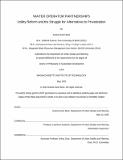| dc.contributor.advisor | Lawrence Susskind. | en_US |
| dc.contributor.author | Beck, Andrea Karin. | en_US |
| dc.contributor.other | Massachusetts Institute of Technology. Department of Urban Studies and Planning. | en_US |
| dc.date.accessioned | 2020-09-15T22:06:28Z | |
| dc.date.available | 2020-09-15T22:06:28Z | |
| dc.date.copyright | 2020 | en_US |
| dc.date.issued | 2020 | en_US |
| dc.identifier.uri | https://hdl.handle.net/1721.1/127618 | |
| dc.description | Thesis: Ph. D., Massachusetts Institute of Technology, Department of Urban Studies and Planning, May, 2020 | en_US |
| dc.description | Cataloged from the official PDF of thesis. | en_US |
| dc.description | Includes bibliographical references (pages 155-175). | en_US |
| dc.description.abstract | The water privatizations that swept across the global South in the 1990s and early 2000s failed to meet expectations. Rather than bringing about increased efficiency and investment, a suite of public-private partnerships ended prematurely and caused social unrest, most notably in the Bolivian city of Cochabamba. In response, scholars and activists embarked on a search for "alternatives to privatization." Informed by the work of the Municipal Services Project and post neoliberal scholarship, this dissertation examines Water Operator Partnerships (WOPs) as a potential alternative to private-sector engagement in water and sanitation. Relying on primary documents and interviews, I trace the WOP concept to its origins in the UN system and highlight its defining characteristics as a partnership type. | en_US |
| dc.description.abstract | I further discuss the struggles behind the concept's emergence, focusing on the contested role of the private sector and the strategies applied by activists trying to safeguard a public orientation of WOPs. Based on two case studies of water companies in the Netherlands and Uganda, I examine the motivating factors that would cause water operators to engage in WOPs on a not-for-profit basis. My findings indicate that WOPs are driven by a number of interests that call into question their portrayal as solidarity-based partnerships, including staff development and the furthering of opportunities for aid, trade, and investment. I then follow the Dutch and Ugandan companies out of their headquarters and into the field, to the water utility serving Malawi's capital Lilongwe. Drawing on fieldwork in Malawi, I examine two WOPs in detail, showing how and why these partnerships failed or succeeded in supporting the reduction of non-revenue water. | en_US |
| dc.description.abstract | Taken together, this dissertation points to a need to refocus the debate on WOPs, beyond the private sector and towards public water and sanitation operators. I argue that two trends in particular deserve critical attention: professionalization and corporatization. Both are somewhat more concealed and less visible than the outright inclusion of the private sector in WOPs, but they could, in the end, pose a more serious challenge to the WOP model and its post neoliberal potential. | en_US |
| dc.description.statementofresponsibility | by Andrea Karin Beck. | en_US |
| dc.format.extent | 175 pages | en_US |
| dc.language.iso | eng | en_US |
| dc.publisher | Massachusetts Institute of Technology | en_US |
| dc.rights | MIT theses may be protected by copyright. Please reuse MIT thesis content according to the MIT Libraries Permissions Policy, which is available through the URL provided. | en_US |
| dc.rights.uri | http://dspace.mit.edu/handle/1721.1/7582 | en_US |
| dc.subject | Urban Studies and Planning. | en_US |
| dc.title | Water Operator Partnerships : utility reform and the struggle for alternatives to privatization | en_US |
| dc.title.alternative | WOPs : utility reform and the struggle for alternatives to privatization | en_US |
| dc.title.alternative | Utility reform and the struggle for alternatives to privatization | en_US |
| dc.type | Thesis | en_US |
| dc.description.degree | Ph. D. | en_US |
| dc.contributor.department | Massachusetts Institute of Technology. Department of Urban Studies and Planning | en_US |
| dc.identifier.oclc | 1193557198 | en_US |
| dc.description.collection | Ph.D. Massachusetts Institute of Technology, Department of Urban Studies and Planning | en_US |
| dspace.imported | 2020-09-15T22:06:27Z | en_US |
| mit.thesis.degree | Doctoral | en_US |
| mit.thesis.department | UrbStud | en_US |
